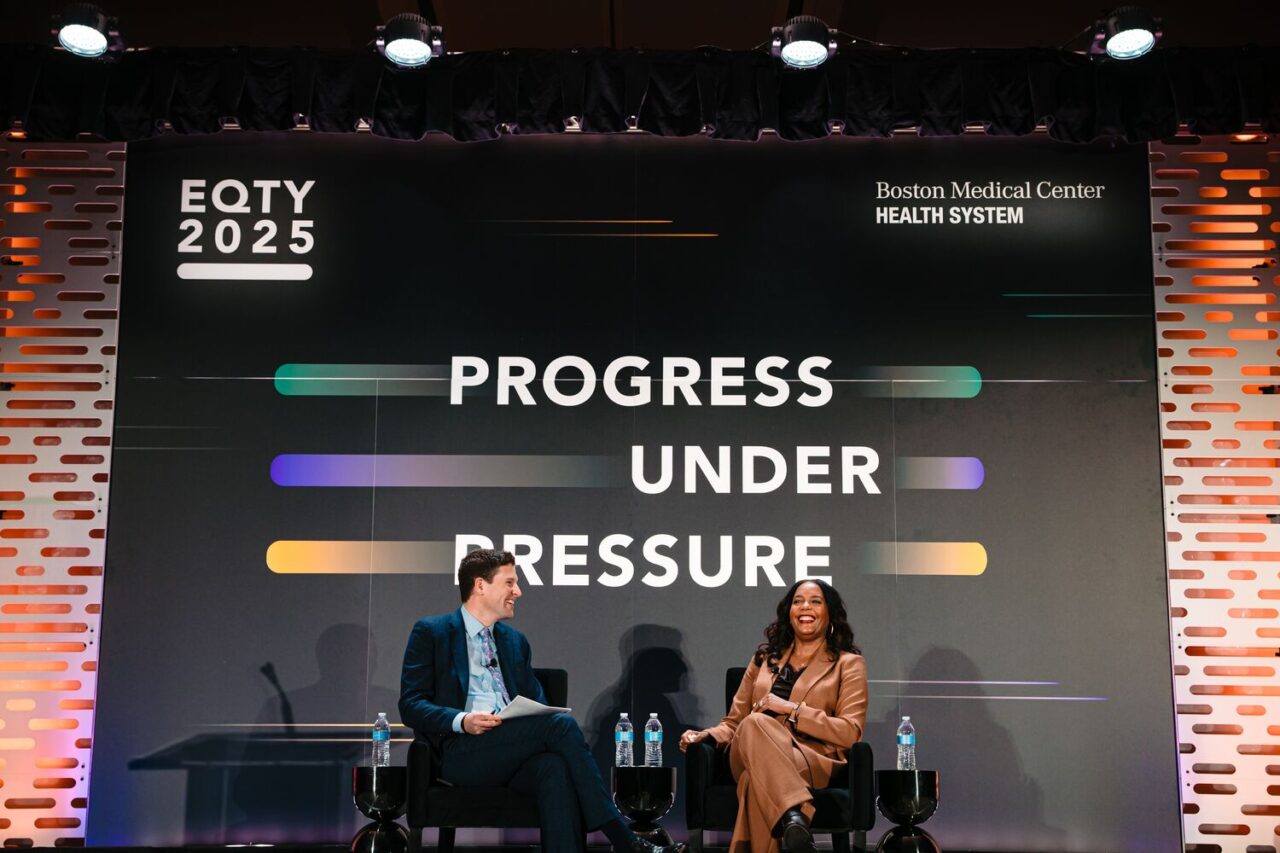“We gather here today, not in spite of pressure, but because of it, because pressure reveals what matters,” said Dr. Thea James in her welcome remarks at EQTY 2025: Progress Under Pressure, Boston Medical Center Health System’s third annual summit focused on health equity.
That notion, that pressure can be the spark that creates action, that drives people forward, echoed throughout the one-day conference, hosted at the Renaissance Boston Seaport hotel and convening leaders all across the country.
And the pressures at hand for the healthcare industry? It was clear on the stage that they were varied and widespread, impacting patients, providers, and communities. EQTY 2025 hosted sessions on some of the more urgent, including the rise of AI and mistrust in healthcare, the cuts to Medicaid, and longevity and the racial mortality gap. But the day wasn’t focused on detailing the pressures themselves; the energy from panelists, keynotes, and BMC speakers was dedicated to finding ways to progress amid these challenges, including with panels on forging true cross-sector synergies and looking to our past legacies and challenges to inform our present.
James had a message for those who feel complacent, or who feel there’s nothing people can do among these external and internal pressures facing our healthcare industry:
“People will tell you you can’t boil the ocean. But let me tell you something: We can debunk all of that. We can boil the ocean, and to do it, we need to stop accepting that communities should drown in it,” she said. “This requires us to fundamentally reexamine, reimagine our role not as healers of individuals, but as architects of equitable thriving communities.”
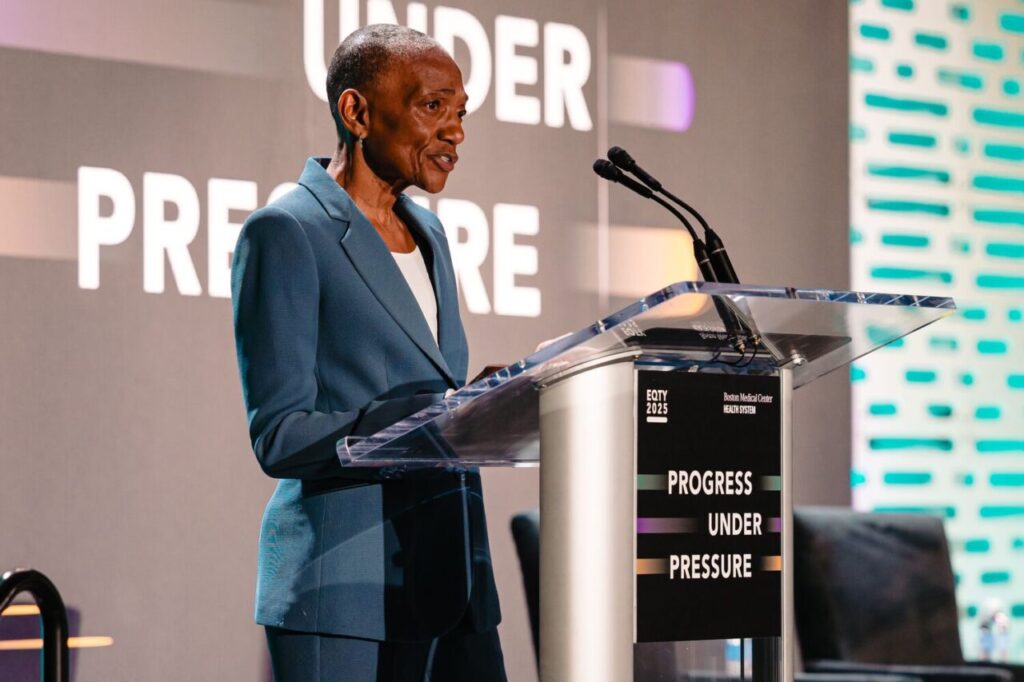 Thea L. James, MD, MBA, Vice President of Mission, Associate Chief Medical Officer addresses the audience at EQTY 2025. (Piper Brown Photography for Boston Medical Center)
Thea L. James, MD, MBA, Vice President of Mission, Associate Chief Medical Officer addresses the audience at EQTY 2025. (Piper Brown Photography for Boston Medical Center)
As the day moved into an expert panel on reckoning with cuts to Medicaid, moderator Symone Sanders Townsend—political strategist, commentator, and host of MSNBC’s “The Weekend”—concisely and poetically stated what became the driving theme of the day: ““Pressure doesn’t always have to paralyze, folks. It can clarify what matters most.”
Fighting against misinformation in healthcare
One of the major pressures facing healthcare that was discussed in nearly every session of EQTY 2025 was the rise of mis- and disinformation in the age of AI and social media, as well as the distrust of science and medicine. In Mayor Keisha Lance Bottoms’ keynote Q&A with BMC Health System President and CEO Alastair Bell, MD, she reminded the audience of a common saying: “A lie makes its way around the world before the truth gets out of bed.”
Mayor Bottoms, former mayor of Atlanta and former senior advisor to the president of the U.S., discussed the repercussions of that dilution of truth.
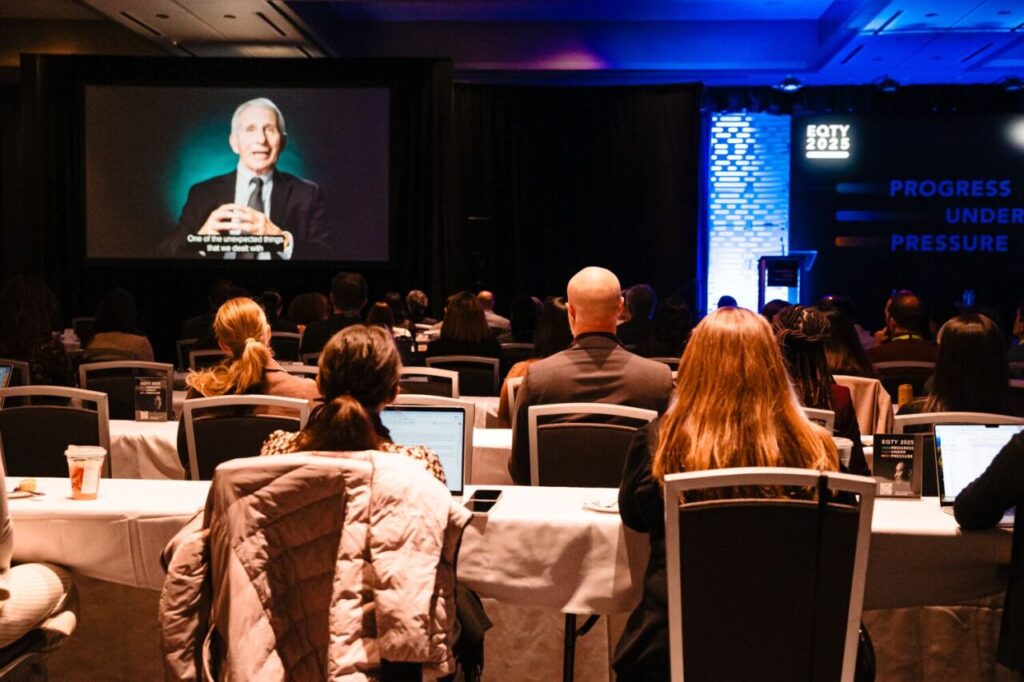 Crowd listens in to virtual remarks from Dr. Anthony Fauci, former Chief Medical Advisor to the President of United States. (Piper Brown Photography for Boston Medical Center)
Crowd listens in to virtual remarks from Dr. Anthony Fauci, former Chief Medical Advisor to the President of United States. (Piper Brown Photography for Boston Medical Center)
“It’s a public health emergency when you can’t get truthful information into people’s hands,” she said. It served both as an echo of earlier in the day and a prelude to sessions to come. In a welcome video from Dr. Anthony Fauci, former Chief Medical Advisor to the President of United States, he said, “I think that misinformation and disinformation, and I’m not alone in this, is really the fundamental enemy of good public health.”
The pressure of mis- and disinformation and the importance of trust reverberated through the panels on the rise of AI and forging cross-sector synergies. In the “Our Health in the Age of AI” panel, experts like Chris Boone, group vice president of Research Services and Life Science at Oracle, underscored how vital inclusive datasets were to building trusted, equitable AI systems. In “Unconventional Alliances: Forging Cross-Sector Synergies,” Santiago Lyon, a former war photographer and current head of the Adobe-led Content Authenticity Initiative has made it his life’s work to combat misinformation and increase transparency in our current environment. What has been pushing him forward under pressure is that nonprofits, corporations, and companies across a vast array of industries have been interested in tools that promote transparency and trust. He sees a future where transparency becomes a standard.
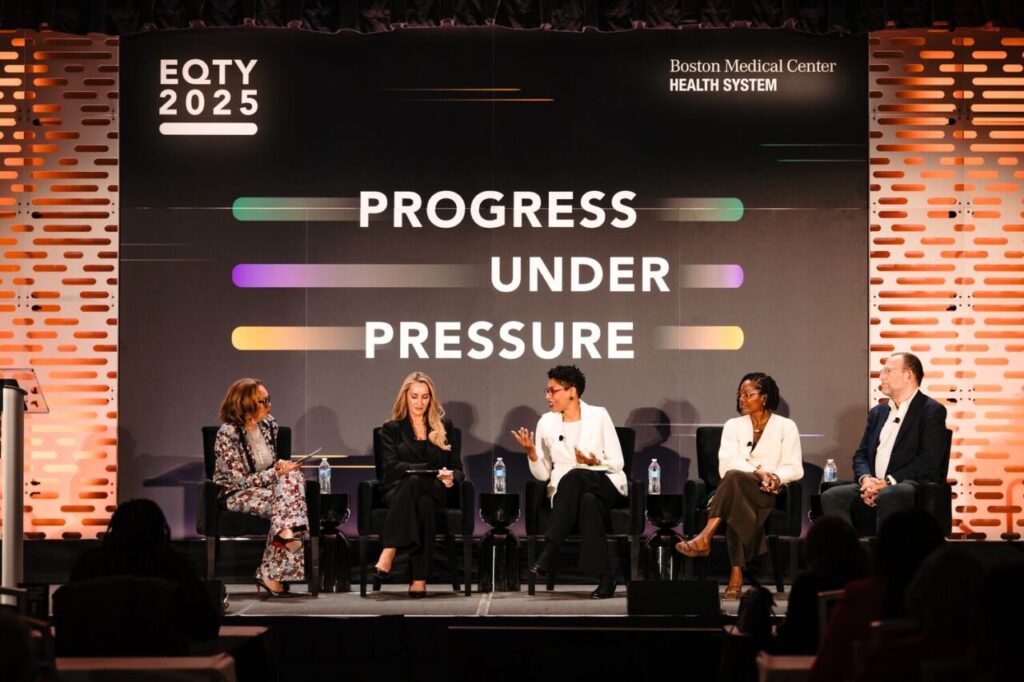 From L to R: Petrina Martin Cherry, MBA VP, Community Engagement and External Affairs, BMC Health System; Johanna Jobin, Vice President, Global Head of Environment and Sustainability, Takeda; Binta Beard, Head US Social Impact & Novartis US Foundation President ; Keri Salter-Shahidi, actress, producer, and co-founder of 7th Sun Productions; Santiago Lyon, Head of Advocacy & Education, Content Authenticity Initiative, Adobe. Cross-Sector Synergies: Forging Unconventional Alliances panel. (Piper Brown Photography for Boston Medical Center)
From L to R: Petrina Martin Cherry, MBA VP, Community Engagement and External Affairs, BMC Health System; Johanna Jobin, Vice President, Global Head of Environment and Sustainability, Takeda; Binta Beard, Head US Social Impact & Novartis US Foundation President ; Keri Salter-Shahidi, actress, producer, and co-founder of 7th Sun Productions; Santiago Lyon, Head of Advocacy & Education, Content Authenticity Initiative, Adobe. Cross-Sector Synergies: Forging Unconventional Alliances panel. (Piper Brown Photography for Boston Medical Center)
“In the corporate space, some of these companies are coming up with use cases for these ‘digital nutrition labels’ … and its expansive. That’s really heartening because, in essence, what we’re developing is a safety tool,” Lyon said about his work on the Content Authenticity Initiative. “Sure, it took 40 years for seat belts to become standard issue in cars in this country. Now you can’t buy a car without a seatbelt. We’re hoping it’s not going to take 40 years for this technology to get going in effect; everything would indicate that we’ll see these nutrition labels more widespread than ever before in a shorter amount of time.”
It was resounding across the day that combatting this misinformation and making any real progress against all pressures to healthcare requires intentional community collaboration. Real change happens when experts stand alongside communities to create solutions together.
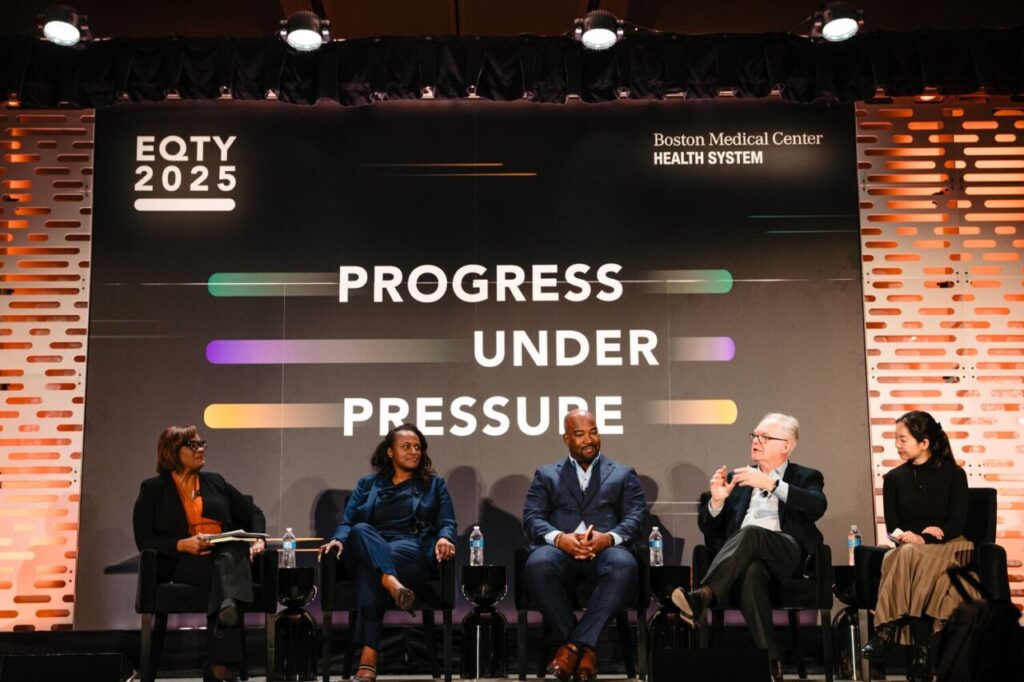 From L to R: Nicol Turner Lee Author, Digitally Invisible: How the Internet is Creating the New Underclass, Founder of the AI Equity Lab, and leading AI expert; Joy Brown, MBA, SVP, Chief Digital Information Officer at BMC Health System; Chris Boone, PhD, MS, FACHE, FHIMSS, Group Vice President, Research Services, Health & Life Sciences at Oracle; Calum MacRae, M.D., Ph.D., Professor of Medicine at Harvard Medical School; Karen Wong, MD, MPH, Chief Data Scientist at Epic. Our Health in the Age of AI panel. (Piper Brown Photography for Boston Medical Center)
From L to R: Nicol Turner Lee Author, Digitally Invisible: How the Internet is Creating the New Underclass, Founder of the AI Equity Lab, and leading AI expert; Joy Brown, MBA, SVP, Chief Digital Information Officer at BMC Health System; Chris Boone, PhD, MS, FACHE, FHIMSS, Group Vice President, Research Services, Health & Life Sciences at Oracle; Calum MacRae, M.D., Ph.D., Professor of Medicine at Harvard Medical School; Karen Wong, MD, MPH, Chief Data Scientist at Epic. Our Health in the Age of AI panel. (Piper Brown Photography for Boston Medical Center)
In the cross-sector synergies panel, Binta Beard of Novartis U.S. Foundation, spoke about how her company is collaborating with communities on the health needs specific to their neighborhoods–different in each city, and not a one-size-fits-all model.
“We know we can’t do it alone. It’s multiple levels of challenges and constellation of factors, both clinical and nonclinical and at the focus. And the center of that for us is listening to and learning from communities,” Beard said. “They have answers. They know what their needs are.”
In the same panel, Takeda’s Johanna Jobin also spoke about co-creating sustainability initiatives with trusted community organizations. AI panelists talked about ensuring community input on new technologies and partnering with underserved communities to ensure that the research data our tools are built on are inclusive. The Medicaid panelists spoke about specific community impacts and the needs to hear from the voices on the ground on alternative solutions, as well as partnering with community organizations to fill the gaps.
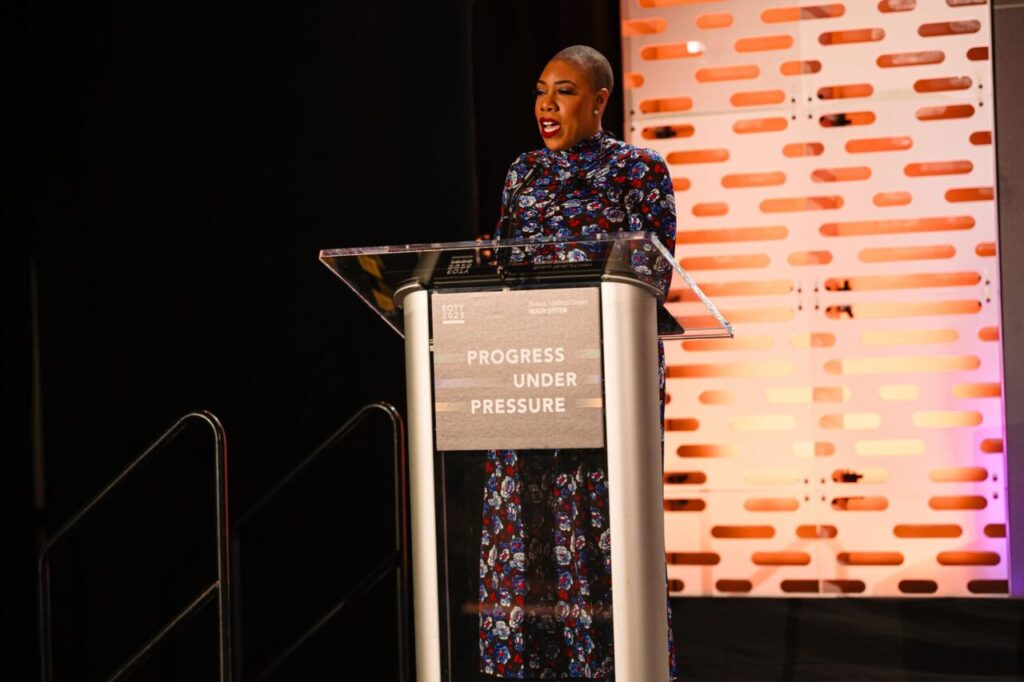 Symone Sanders Townsend addresses the crowd at EQTY 2025. Piper Brown Photography.
Symone Sanders Townsend addresses the crowd at EQTY 2025. Piper Brown Photography.
These intentional partnerships, the event seemed to say, was the way to build a foundation of trust. And moving forward against progress would be impossible without trust.
“There is an element of human connection that’s needed in this [health] industry, unlike any other industry that we have,” said Chris Boone in his panel on the rise of AI. “And I think that—getting back to the point of governance and getting back to the point of community engagement—I think it all boils down to trust and transparency.”
Standing in your own power
One of the core tenets of EQTY 2025 was, “if not us, then who?” And while community collaboration and partnerships are core to progress, so is realizing and actualizing our individual powers—according to many panelists across the day.
Perhaps no panelist was as clear on this message as Miss Louise, a 90-year-old community member who spoke about her life experience and aging in a panel on longevity. She discussed caring for her children, her aging mother, her ill spouse, and how now is a time in her life for self-love and self-care.
“When [my husband] passed away 13 years ago, people were saying, ‘What are you going to do?’ I said, ‘Just find out. I’ll take care of me. Don’t worry about me,’” said Miss Louise. “And this is why I love me. They found out that I’m taking care of myself, not with anybody else, just me. I don’t have time to fill anybody else’s pill boxes, no pill boxes, just about me.”
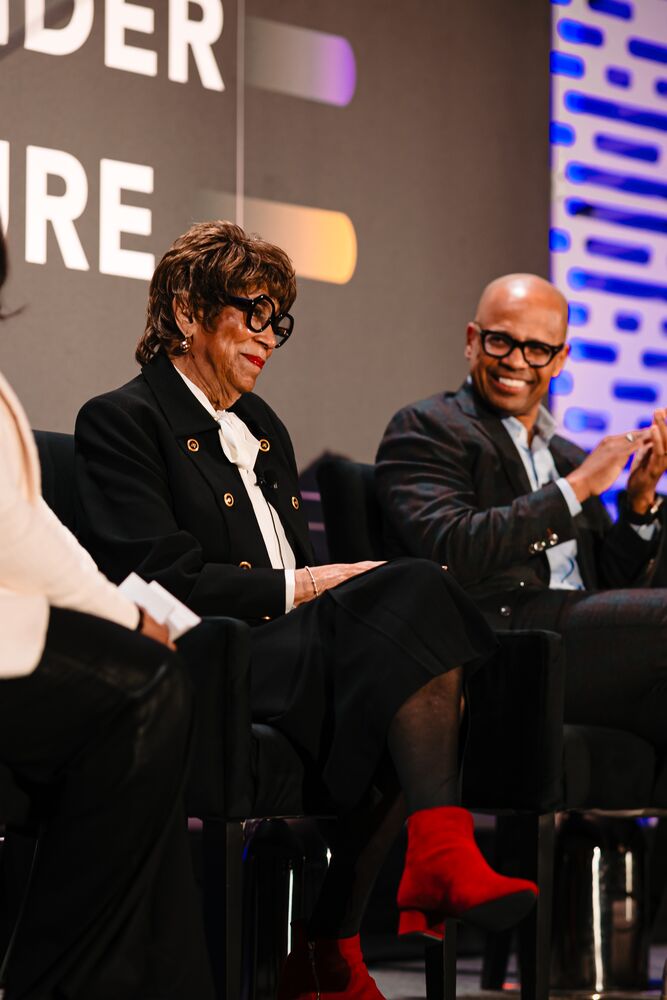 L to R: Miss Louise Johnson and Demond Martin share thoughts on the panel titled, “Who Gets to Live Longer? Longevity Research, Systems, and Science” (Piper Brown Photography for Boston Medical Center)
L to R: Miss Louise Johnson and Demond Martin share thoughts on the panel titled, “Who Gets to Live Longer? Longevity Research, Systems, and Science” (Piper Brown Photography for Boston Medical Center)
This work against pressures isn’t easy, the audience heard from many different speakers. But standing in this self power like Miss Louise is something that other speakers also spoke about. Dr. Michael Eric Dyson, in a fireside chat, spoke about remembering our legacies and using that as a sort of fuel to progress forward.
“We have already come through what we have come to. This is not the first time,” he said, speaking to the obstacles and headwinds that many on the stage and in the audience have already faced and pushed through.
Keynote Mayor Bottoms also spoke about this self power when she shared her path to progress. What she said was based on advice she received after her term as mayor of Atlanta.
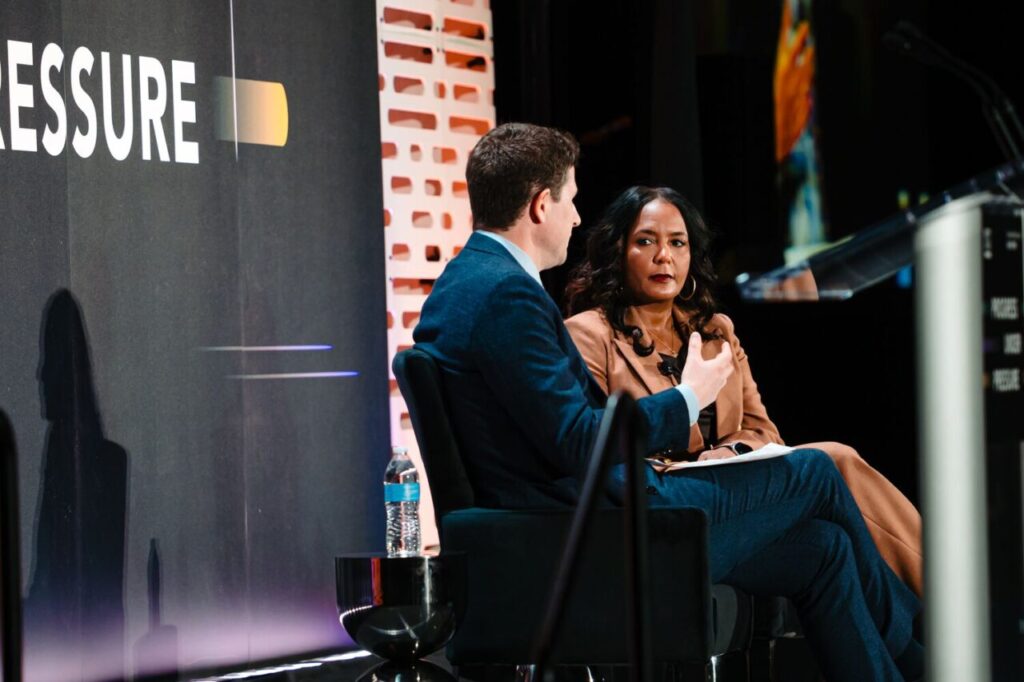 Keisha Lance Bottoms, former mayor of Atlanta and former senior advisor to the president of the United States takes the stage as the keynote speaker for EQTY 2025. (Piper Brown Photography for Boston Medical Center)
Keisha Lance Bottoms, former mayor of Atlanta and former senior advisor to the president of the United States takes the stage as the keynote speaker for EQTY 2025. (Piper Brown Photography for Boston Medical Center)
“Women push through, and they have heart attacks, they have high blood pressure, they have strokes, and they die,” Mayor Bottoms repeated. “Powerful women stop. They feel, they process, they learn a lesson, and then—and only then—they move on.”
“And my challenge and advice to each of you, men and women, are you being powerful in this season,” she continued. “I think so many of us have been strong the past few years, but this season I truly believe calls for us to be powerful. And I just challenge you to ask yourself, are you being powerful? And if not, how do you take that strength and turn it into power?”

